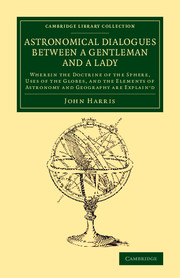
- Publisher:
- Cambridge University Press
- Online publication date:
- June 2015
- Print publication year:
- 2014
- First published in:
- 1719
- Online ISBN:
- 9781316105955

An Anglican clergyman and fellow of the Royal Society, John Harris (c.1666–1719) was an important promulgator of Newtonian science, through private teaching, public lectures and published writing. His Lexicon Technicum (1704) may be considered the first encyclopaedia in English. In the present work, published in 1719, Harris presents for his well-to-do readership a series of didactic conservations between a gentleman of science and an aristocratic lady. He aims to induce 'persons of birth and fortune' to dedicate some of their 'happy leisure … to the improvement of their minds', and uses quotes from poets such as Samuel Butler and John Dryden to help elucidate scientific concepts. In particular, Harris explains the use of contemporary scientific apparatus (and expensive status symbols) such as terrestrial and celestial globes. The book ends with a description of the ultimate contemporary symbol of scientific refinement: the orrery, a working model of the solar system.
 Loading metrics...
Loading metrics...
* Views captured on Cambridge Core between #date#. This data will be updated every 24 hours.
Usage data cannot currently be displayed.